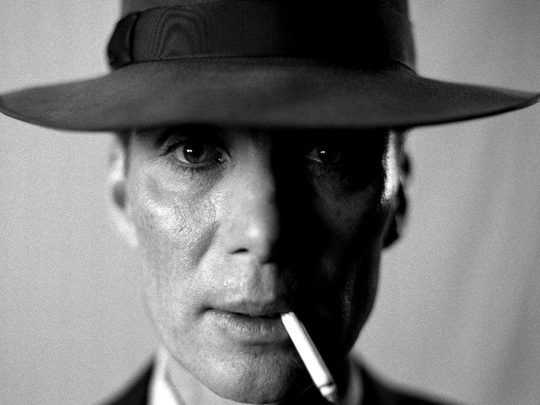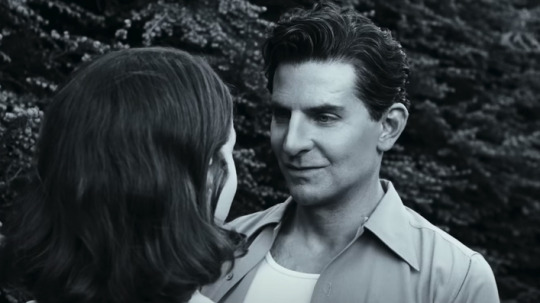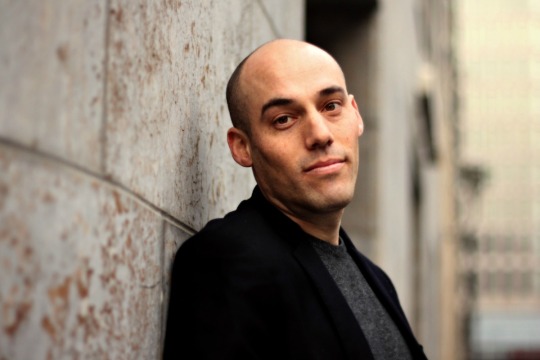#oppenheimer is jewish
Text
there is something so satisfying about two of the most famous and anticipated movies this year, that both broke box office records, both having a jewish protagnist. take that antisemites.
#oppenheimer is jewish#i didn't know but it's reference multiple times throughout the movie and is a fairly important thing#and they have multiple other jewish characters. like a good third of them#barbie is jewish#barbie was made by a jewish woman#and they make a few (respectful) jokes about being jewish that were actually really funny#WIN FOR THE JEWS#jewish#jew#jewish tumblr#oppenheimer#barbie#barbenheimer#barbie movie#barbie 2023#oppenheimer movie#oppenheimer 2023#ruth handler#AND in barbie the woman who plays ruth was jewish along with one the lead writer and others
1K notes
·
View notes
Text
A lot of people talking about Oppenheimer are saying things like "just watched a bunch of white men talking for three hours" or "watching a white man build a bomb"
this is a movie where the main character and a significant number of side characters are Jews that takes place in the late 1930s-40s. Jews were absolutely not considered white at that time. In the US, they would've been racialized as Hebrews and faced a lot of discrimination for it
The movie didn't do a great job of showing that, but it's true. Oppenheimer isn't some white man who built a bomb because he was not racialized as white during the Manhatten Project.
This doesn't affect the morality of his actions at all and there's absolutely no reason not to shit on him for what he did, but don't erase his Jewishness when you do so. Especially because him being a Jew during the Holocaust times and wanting to stop the Nazis was a big part of his motivation to build the bomb.
2K notes
·
View notes
Text
Just saw someone on Twitter complain about the lack of Japanese people in Oppenheimer, and what did you expect??? Did you want the final act to be the bomb dropping and see people burning alive???
The reason why we don't see a Japanese perspective is because one, including a Japanese perspective, just to see how bad the suffering was would be exploitation. Two, to see an accurate and sensitive take on how the japanese felt about Oppenheimer, Christopher Nolan (as incredible as he is) isn't the right person to do this. And three, it's based on Oppenheimer's biography
Oppenheimer, the movie, literally shows you people (mostly the superiors, because by the middle/end of it you see Oppenheimer regretting his creation) doing something dubious and inhumane because they removed themselves away, both emotionally and physically, from the people they are hurting.
Nagasaki and Hiroshima only exist in those men's distant thoughts and imaginations. One guy literally asks to take a city off the bombing because that's where he had his honeymoon. It's disturbing and unsettling, as if those people were not real human beings. The lack of Japanese people drives the entire point home.
Also, Japanese cinema is right there. Barefoot Gen, Grave of the Fireflies, or Hiroshima (responsible for showing to many Americans the effects of the bombs for the first time) are just a few of the many, many decades of post-war Japanese movies we have
#important to say this just my opinion and im more than glad to talk and discuss about it#also i dont think a single person left this movie thinking Oppenheimer was the greatest person ever or left as a pro atomic bomb#you could literally feel the entire room's tension after the trinity test scene and what that meant when they succeeded#as the movie ended almost everyone was in silence i left that room in complete silent#its also important to say that although i do say the scientists didn't thought about the suffering japanese people would go through#this is more a dig forwards the superiors not the scientists because a lot of the scientists (Oppenheimer included) were jewish#so they were creating that people with the sole purpose of stoping the nazis and not hurt civilians#also to the people that keep saying 'oh what was japan doing/dont act like japaneses were innocent' dude i get what youre saying#but do you honestly believe all those civilians deserved that??? they were civilians not all of them agreed to what was happening#oppenheimer#oppenheimer 2023#barbenheimer#christopher nolan#cilian murphy
3K notes
·
View notes
Text
Also I think it's awesome Oppenheimer (the movie) made such a strong connection between Oppenheimer being Jewish and deciding to make an atomic bomb. I'm sure that won't lead to any insane discourse or antisemitic conspiracy theory bullshit in the coming weeks.
#oppenheimer#i've already had someone in my notes call him a 'jewish anti-fascist used by the united states'#it's gonna be rough
433 notes
·
View notes
Text

165 notes
·
View notes
Text
am i the only one that feels like. really weirded out about the obsession over the oppenheimer movie lmao
#usamerican exceptionalism#usamerican imperialism#like so many indigenous people were killed by the us government in their pursuit to kill a bunch of japanese people#also so many people on that team of scientists were jewish refugees from europe whose trauma was being used to manipulate them into doing#this. am i the only one haunted by so many vocal expressions of regret. idk#project manhattan#oppenheimer critical#anarchist#anti imperialism#antiracism
78 notes
·
View notes
Text

121 notes
·
View notes
Text
A Quick Note on 'Jewface', Maestro and Oppenheimer
Given that my presence on this platform is filtered specifically through the lens of Jewishness in film, and that I wrote my undergraduate dissertation on the Jewish identity of Leonard Bernstein – the subject of Bradley Cooper’s controversial upcoming film, Maestro – I thought I’d weigh in on the current discourse.
For those who are unaware, one of the biggest films due to premier as part of this year’s autumn film festival season is Bradley Cooper’s Maestro. The film is said to be a non-traditional biopic of 20th century American composer Leonard Bernstein, focusing largely on his complex relationship with his wife, Felicia Montealegre. Controversy has arisen around the Netflix production due to images from the trailer featuring Bradley Cooper as Bernstein wearing an enlarged prosthetic nose. Voices within and outside Jewish communities have loudly criticised Cooper for caricaturing Jewishness, using the term ‘Jewface’ which describes the act of a goyische (non-Jewish) actor using prosthetics to make themselves look more like a cartoonish, imagined Jew.
While it is true that Bernstein did own a decent sized schnoz, the prosthetic utilised by Cooper is significantly bigger, and more defined than the nose was in reality. From a personal standpoint, I do find the use of this prosthetic to be pretty discomforting, but I think it speaks more to Cooper’s insecurity about the size of his own nose, which is a lot bigger than perhaps he would like to admit (and not too dissimilar to Bernstein’s actual nose!), than it does about his perception of Jews. That being said whether it was his intention to cartoonify Jewishness or not, Cooper has ruffled feathers in a way that is crass rather than substantive. Bernstein’s living relatives have come out in support of Cooper and his decision to use the prosthetic, saying that Bernstein would not have minded, but I think their statement rather misses the point. The nose is not about Bernstein himself, but about highly visible representations of a tiny minority that are stereotypical and incredibly reductive.
Funnily enough, however, Cooper’s use of ‘Jewface’ is the element of Maestro that bothers me the least. I have been fairly vocal since the film’s announcement about how I believe the production as a whole to be a pretty catastrophically bad idea. Leonard Bernstein is my number one creative hero – as a composer, public intellectual and educator, I don’t think there has been a single Jewish figure in American history who has had more of a positive impact on culture.
As I mentioned, I have written extensively about Bernstein in an academic context, and in researching him, it became clear to me just how vitally important his Jewish identity was to him throughout his life. It informed his music (even West Side Story, which was initially conceived as a story about Jews and Catholics on the Lower East Side of Manhattan), and his role as an educator (he often described his pedagogy as rabbinic in nature), and he was deeply, foundationally affected upon learning about the realities of the Holocaust which caused what he described as ‘aporia’, a state of being where he was too overwhelmed to write a single word for years. Bernstein’s complicated relationship to sexuality was also hugely significant in his life. There is still debate to this day about whether, given an open, accepting environment, he would have identified as a gay man or as bisexual. He had significant, passionate relationships with both men and women, and was an early major advocate for HIV/AIDS research.
My problem with Maestro is that I don’t have faith in Bradley Cooper as a writer/director, to sensitively depict these two massive aspects of Bernstein’s identity. Focusing on his most significant straight-passing relationship as the centre of a film called Maestro does not inspire confidence that the film won’t totally whitewash Bernstein’s Jewishness, or reduce his sexuality to the pain it caused his wife (in a similar way to other reductive music biopics like Bohemian Rhapsody or Rocketman). Cooper’s own identity is significant in that he is starting from a place of remove from the identity of his subject, which isn’t necessarily a dealbreaker, but when there are other filmmakers out there who are far better suited to a project like this, both from an identity perspective and a thematic one, it’s hard to justify why this project exists at all in its current form.
Some have pointed to the involvement of Steven Spielberg as a producer on the project as hope for better representation, but given that Cooper and Martin Scorsese – a filmmaker who I have criticised in the past for the didactic, Christian morality of his movies – are also credited producers, I don’t think it’ll make much difference. I’m more comforted by the involvement of Josh Singer (Spotlight, The Post) and his contribution to the screenplay, given his Jewishness and his work on thematically sensitive historical films.
I’m not writing off the film entirely just yet. I had similar worries about Oppenheimer, given the significance of the scientist’s Jewishness in his decision to start work on the bomb in the first place. Nolan and Cillian Murphy, thankfully, proved me wrong in the director’s decision to focus on the differing Jewish identities of Oppenheimer, Lewis Strauss, and I.I. Rabi, and the nuanced ways in which their characters were informed by Jewishness, as well as Murphy’s attention to detail in his performance. It’s certainly possible for non-Jewish filmmakers to consider Jewishness in a valuable way (see Todd Field’s Tar or Paul Thomas Anderson’s Licorice Pizza for a couple of recent examples), but the set-up of this project makes it hard for me to believe that Cooper is one such filmmaker.
To end with a little self-gratifying what-if, I thought I’d lay out what would be my ideal Bernstein biopic: a film centred around the relationship between Bernstein and his fellow queer, Jewish composer and mentor, Aaron Copland, the letters they wrote to one another, and the fallout of their brushes with McCarthyism which had vastly different outcomes. I would keep Cooper as Bernstein (without the prosthetics!) because he can convincingly play the man’s charm, I’d cast Michael Stuhlbarg as Copland, and get Todd Haynes to write and direct. Haynes is Jewish, gay, and has a great deal of experience directing sweeping, romantic, dark, and political films. He knows how to portray music on screen and has several masterful period-pieces under his belt, with Carol in particular as a shining example of complex, historical queer romance in America. Honestly, this would be my dream film project.
#blu ray#blu ray collector#blusforjews#cinema#cinephile#film#film tumblr#jewishness#jewishness in film#maestro#leonard bernstein#bradley cooper#jewface#antisemitism#oppenheimer#christopher nolan#todd haynes#michael stuhlbarg#aaron copland#biopic#music biopic#queerness#queer history#gay#bisexuality#lgbt representation
52 notes
·
View notes
Text
'Oppenheimer,' 'Golda,' 'Maestro': Will the Real Jewish Actors Please Stand Up?
Three major films choosing not to cast Jews in starring roles, and the Academy’s silence on the omission of the ethnoreligious group from its diversity initiative, signals a troubling moment.



...That Nolan wrote a film about one of the most famous Jewish scientists to ever live without at least considering a Jewish actor for the role is emblematic of a problem that continues to pervade the entertainment industry, one that has rightly pushed for increased diversity, equity and inclusion and advocated on behalf of every ethnicity and race — except for Jews.
"...Anytime there's a character — and I don't even talk about historical impact, just a powerful character — it's never played by a Jewish person,” says [Jonah] Platt. “And I feel like that comes from this aversion to Jews being powerful.”
...When non-Jews are cast as Jews, the performances tend to fall back on hackneyed caricature and cliches. Think: loud, exaggerated personalities with Brooklyn accents and enunciated hand gestures. See: Rachel Brosnahan in The Marvelous Mrs. Maisel or Wendi McLendon-Covey in The Goldbergs. In Maestro and Golda, both Cooper and Mirren wear prosthetic noses.
#woof#jewish representation#antisemitism#oppenheimer#golda#maestro#movies#watch golda or maestro win the hair and makeup oscar for those fucking noses
20 notes
·
View notes
Photo

Joshua Oppenheimer
Gender: Male
Sexuality: Gay
DOB: 23 September 1974
Ethnicity: Ashkenazi Jewish
Nationality: American
Occupation: Director, producer
#Joshua Oppenheimer#lgbt#lgbtq#homosexuality#mlm#male#gay#1974#jewish#Ashkenazi Jewish#director#producer
59 notes
·
View notes
Text
Honestly the best part of Oppenheimer wasn’t the bomb or the hearing scenes, it was the guy on the train telling Oppenheimer he’s gotta eat more
#This is not joke#it was just really nice#oppenheimer#Two scenes of That fellow jewish man Offering him orange slices did more for Oppenheimers pathos than the entire 3 hours 20 minutes of run
12 notes
·
View notes
Text
People who bitch about Oppenheimer not showing or focusing on Japan, and calling the film “Sad White Man Movie” need to go back to history class. Or WATCH the film that you’re bitching about. Or at least understand how movies work.
Do you also whine that Turning Red didn’t say anything about 9/11??
#Oppenheimer#Stupid fucks on Tumblr#Why would a movie named after its own subject#Who was a JEWISH man by the way#Have extensive focus on Japan and the Japanese#This isn't a bullshit reclaim the narrative thing#Y'all are just straight up ignorant#The whole thing with Japan is another matter entirely
12 notes
·
View notes
Text
Whenever I talk about serious Jewish issues like the Shoah I’m always reminded that the vast majority of the world isn’t Jewish and doesn’t really get it. Even people who claim to be allies.
A partner at work randomly brought up oppenheimer and how he thought it was weird for someone to go see a movie about an “evil” man building a bomb and I just wanted to point out that he was severely traumatized from the Shoah and was being emotionally manipulated by the us government etc and immediately got shut down.
He went on to dismiss what I had to say (not that he let me say my piece) and basically implied that oppenheimer was stupid/somewhat evil for building the bomb and I couldn’t even get a word in to point out that literally no one was helping the Jews and oppenheimer thought this was the only way to save his people etc
Then he just says that the conversation isn’t fit for work but if that’s the case why bring it up? It’s just the utter lack of empathy that caught me off guard because I thought he was an ally.
Wasn’t even trying to get him to defend the bomb (I don’t think it should’ve been built either) I was just trying to have him engage in empathy and acknowledge how utterly traumatic the Shoah was and how grief can blind you.
#tw shoah#oppenheimer#also this hits worse since I’m reading a book about Jewish oppression rn#jumblr
14 notes
·
View notes
Text
And I posted about this on the main the other night, but my feelings about when gentiles can or should play Jewish characters is very complicated. I don't know if I'd take the sharp stance of saying only Jewish actors should ever play Jews but there's definitely a very gendered element into who is acceptably Jewish as well as obviously ethnic factors. For example, I look a lot more like Felicity Jones than I look like Ruth Bader Ginsberg, but I think a Jew who looks like me with blue eyes and not noticeably Ashkenazi features would still be inappropriate to cast as Ruth Bader Ginsberg and instead, they should have gone with an actor who LOOKS like Ginsberg. But it would be fine to cast someone like me or Rachel Bloom in the role of Midge from the Marvelous Ms. Maisel or hell Rebecca Bunch from Crazy Ex-Girlfriend because they are fictional....but they can't be the only representation of Jewish women on TV. And with the exception of the two leads of Broad City (which has been off the air for how long?) typically as far as women go, that is the image of Jewishness deemed "acceptable." So obviously there is more nuance going on then just blanketly stating "Oh as long as you cast a Jew, it's inherently okay."
And yes it is hurtful to have your Jewishness doubted because you "don't look Jewish" and I know Dianna Agron has talked about how she never gets cast in Jewish roles because of her appearance even though she wants them and that must suck but also it's not about us.
#I already made a post about men on the main the other night and who gets cast in what roles and why#and I would be a lot harder on Cillian Murphy if he weren't so damn good in Oppenheimer and if honestly I'm actually fine with not claiming#him lol (I mean not really bc antisemitism is part of the movie in terms of the Red Scare but it's subtle and you know what I mean)#Robert Downey Jr. actually stood out to me more as someone I didn't buy as Jewish or as a Southerner (as a Southern Jew)#but also I'm glad that he didn't try to do a Southern accent because anyone who follows the main KNOWS how I feel#about fake Southern accents
9 notes
·
View notes
Text
I appreciate JewishCurrents, I really do, but y'all really need to have more Jewish people of colour contributing as writers and editors... 🤷🏻♀️
#their podcast episode on Oppenheimer was a little disappointing. would appreciate more jewish voices of colour#and sometimes Peter Beinhart can be rather patronizing in the gen x/older millenial way in his articles
2 notes
·
View notes
Text
Barbenheimer conclusion is i enjoyed barbie more bc i am allowed to expect more with regards to political commentary from christopher nolans oppenheimer than i am from greta gerwigs fuckin barbie 😂
#greta gerwigs feminism was exactly as shallow as i expected it to be and in some parts i was pleasantly surprised#oppenheimer was an insult to the jewish people and also women#And the dutch although that i find mostly funny#even if it is a microchosm of what i found jarring and half baked about the movie
9 notes
·
View notes